|
 3/15/2010 - Hungarian Americans commemorate Hungarian National Day. President Obama sends congratulations. The 1848 Hungarian Revolution, under its leader Louis Kossuth, sought to throw off the Austrian Yoke. It failed after Russian intervention, 3/15/2010 - Hungarian Americans commemorate Hungarian National Day. President Obama sends congratulations. The 1848 Hungarian Revolution, under its leader Louis Kossuth, sought to throw off the Austrian Yoke. It failed after Russian intervention, 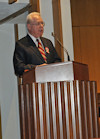 but its impact on the United States is felt even today. This year's commemoration of 1848 was organized by the American Hungarian Federation of Metropolitan Washington, DC, and held on March 14, 2:30 p.m., at the Kay Spiritual but its impact on the United States is felt even today. This year's commemoration of 1848 was organized by the American Hungarian Federation of Metropolitan Washington, DC, and held on March 14, 2:30 p.m., at the Kay Spiritual 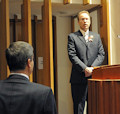 Center of the American University. Center of the American University.
Each year, speakers focus on the significance of the 1848 revolution and how its ideals and goals 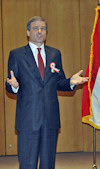 relate to the political climate in today's Hungary.Zoltan Bagdy, AHF Co-President andChair of its Cultural Affairs Committee, welcomed guests and opened the ceremonies. Bryan Dawson, AHF Executive Chairman, sang the national anthems of the United States and Hungary. Hungarian Ambassador Dr. Béla Szombati delivered a welcoming address. relate to the political climate in today's Hungary.Zoltan Bagdy, AHF Co-President andChair of its Cultural Affairs Committee, welcomed guests and opened the ceremonies. Bryan Dawson, AHF Executive Chairman, sang the national anthems of the United States and Hungary. Hungarian Ambassador Dr. Béla Szombati delivered a welcoming address.
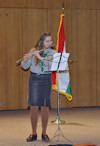 Members of the the The 4th Bátori József Hungarian Scouts Troop of Washington, DC, provided a major part of the program. Lydia Nyerges performed a flute solo Members of the the The 4th Bátori József Hungarian Scouts Troop of Washington, DC, provided a major part of the program. Lydia Nyerges performed a flute solo 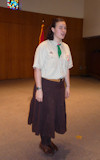 of Brahm's "Hungarian Dances." She was followed by Emõke Tóth who recited the "Nemzeti Dal." Members of the troop gave additional readings. of Brahm's "Hungarian Dances." She was followed by Emõke Tóth who recited the "Nemzeti Dal." Members of the troop gave additional readings.
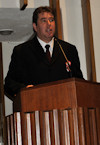 This year's keynote address entitled, "Az Örökségbe Kapott Szabadság" ("") was given by Rev. László Petró commented on the meaning behing the Revolutions slogan of "Freedom, Equality, Brotherhood." This year's keynote address entitled, "Az Örökségbe Kapott Szabadság" ("") was given by Rev. László Petró commented on the meaning behing the Revolutions slogan of "Freedom, Equality, Brotherhood."
"A szabadság, egyenlőség, testvériség jelszavak lényegében a felvilágosodás polgárosodó világának voltak a természetes életérzései, ugyanis e kiváltságokat az ember születésénél fogva birtokolja. A pesti forradalmi eseményeket ez a fajta szekuláris filozófia hatotta át. Jóllehet, ezt a természetes életérzést a magyar polgárok nemigen érezhették a Monarchia elnyomó köteléke alatt, de éppen ez az, ami emeli a forradalom értékét és méltóságát, mert tulajdonképpen nem történt más 1848. március 15-én, mint az első és valaha volt legerőteljesebb kiáltása egy népnek, amelynek életéből elvették annak a reménységét, hogy egy kölcsönkapott országot megőrizzenek és továbbadjanak gyermekeiknek. Egy nép első és valaha volt legerőteljesebb kiáltása hallatszott Budapest utcáin, amellyel azt üzenték a világ felé, hogy mi nem mondunk le arról a velünk született jogról, hogy magunk válasszuk meg életünk. S ha sorsunkat mi magunk nem is irányíthatjuk, azt viszont megválaszthatjuk, hogy kinek kezébe tesszük azt le. A magyar nép nem mondott le a választás jogáról. Mert egyszer, s mindekorra ezt jelenti a szabadság, ezt jelentik a forradalom eszméi: választani."
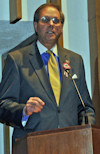 AHF President and Public Affairs Committee Chair, Frank Koszorus, Jr. relayed a similar theme in his address entitled, "Reflections on Kossuth's Legacy in America" where he explores Louis Kossuth and the 1848 revolution's influences on America and why we remember Kossuth today. He remarked: AHF President and Public Affairs Committee Chair, Frank Koszorus, Jr. relayed a similar theme in his address entitled, "Reflections on Kossuth's Legacy in America" where he explores Louis Kossuth and the 1848 revolution's influences on America and why we remember Kossuth today. He remarked:
"We not only commemorate, we are inspired by Kossuth and the Hungarian heroes of 1848 – 1849, just as we are inspired by the true heroes of 1956.
As the Congress noted, Kossuth’s visit left a permanent legacy in America. Well, as Americans we are in a privileged and favorable position to build on that legacy.
Indeed, Americans and Hungarians share common values and interests.
Clearly it’s in both America’s interest and Hungarians’ interest that democratic institutions and the rule of law be strengthened in Central and Eastern Europe and that corruption be eliminated.
Clearly it’s in both America’s interest and Hungarians’ interest that Hungary be led by individuals with vision and fortitude, leaders who are capable of shedding the lingering and numbing effects that the totalitarianism of the Cold War period still have on some.
Clearly it’s in both America’s interest and Hungarians’ interest that regional security and stability be enhanced by the ability of Hungarians in the countries surrounding Hungary to fully enjoy the fruits of democracy;
for them to be free from discrimination and intolerance;
to have the Bolyai University restored as a Hungarian institution of higher learning in Kolozsvar;
to be entitled to autonomy, internal self-determination and local self-government;
to be free from a law that criminalizes the use of the Hungarian language, as the anti-democratic andodious Slovak language law does; and I could go on."
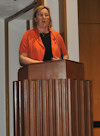 The Rev. Judit Mayer of the Hungarian Reformed Church of Washington, D.C., was the last speaker. She offered a closing prayer that reflected on the writings of Hungarian hero and poet, Petofi Sandor: The Rev. Judit Mayer of the Hungarian Reformed Church of Washington, D.C., was the last speaker. She offered a closing prayer that reflected on the writings of Hungarian hero and poet, Petofi Sandor:
"Tisztelt Ünneplő Közönség! Kedves Vendégek!
E szép ünnepség méltó lezárásaként hadd köszönjem meg először is a közreműködőknek a sok készülést és munkát. Öröm, hogy minden évben vagyunk néhányan, akiknek fontos megemlékezni erről a nemzeti ünnepről.
Zárszavamban hadd használjam fel Petőfi Sándor gondolatait, amelyeket a Nemzeti Dalban már hallottunk. Parafrázis-szerűen elmondanám nem azt, hogy mit kiván a magyar nemzet, hanem hogy én mit kivánok a magyar nemzetnek.
- A vers igy kezdődik: Talpra Magyar, Hi a haza. Itt az idő. Igen, itt az idő. Most is lehetőség van eldönteni, hogy rabok akarunk-e maradni, ugyan nem a Habsburg igában, vagy más ország elnyomása alatt, de a sok gazdasági és erkölcsi bilincsben. Idő lenne megszabadulni a nemzetet sújtó medúza-szerűen fojtogató rabságból.
- Ősapáink szabadon éltek a magyar földön – vajon magyar lesz-e még a föld, amelyben nyugszanak? Van-e még, akinek fontos az életet, kenyeret adó föld, s van-e még, aki őrködik afelett, hogy e föld magyar föld maradjon?
- Ki most, ha kell, halni nem mer - vannak-e olyanok, akik akár életüket áldoznák a nemzetért? De legalábbis is idejüket, tudásukat, szeretetüket, akik nem a saját boldogulásukért akarnak a nemzet élére álllni, hanem azért, mert a maguk érdekénél tovább látnák, látnak egy viziót a nemzet jobbulásáért?
- Láncot hordunk ismét. S bár nem kivánom, hogy fegyverek csörögjenek magyarok kezében, le tudjuk-e szaggatni a béklyókat, amelyeket a pénz istene, a mammon aggatott ránk, a depresszió, a kilátástalanság, a jövőtlenség, a reménytelenség. Le tudjuk-e szaggatni a béklyókat, amelyeket úgy szereztünk, hogy világviszonylatban élen járunk a bennünket pusztitó betegségekben, egyéb negativ dolgokban, mint válás, alkoholizmus, és sorolhatnám? Visszakapjuk-e testi és lelki egészségünket, hogy ne a szörnyűségekben járjunk élen, hanem becsülendő dolgokban? Annyi tehetséges magyar van szerte a világon, jó lenne az ő sikereikről elhiresülni.
- A magyar név megint szép lesz, méltó régi nagy hiréhez..... Szeretném hinni, hogy újra szabad lesz a magyar nevet becsülettel, tisztességgel emlegetni. Szeretném hinni, hogy nem kell szégyellni, ha magyarnak valljuk magunkat, szeretném hinni, hogy szabad tiszta szivvel kijelenteni, magyarok vagyunk, szélsőségektől mentesen, de emelt fővel. Szeretném hinni, hogy a magyar név régi hiréhez méltóan lesz szép, hogy azok az értékek erősödnek meg, amelyekért a márciusi ifjak is harcoltak. Szeretném hinni, hogy lesz megint erkölcs, hogy lesz megint hazaszeretet, hogy lesz megint Isten-hit, hogy lesz megint becsület, önfeláldozás, magunkon túlmutató erőfeszités.
- És szeretném hinni, hogy lesznek unokáink. Hogy igenis lesznek, akik mernek és akarnak gyermeket vállalni. Hogy lesznek, akik nem számogatják, mennyibe kerül egy gyermek felnevelése, hanem biznak magukban, s abban, hogy felülről erőt és segitséget kapnak a gyermekek felneveléséhez. Hogy lesznek, akik majd leborulnak sirjainkon, akik emelt fővel emlékeznek ránk, és lesznek, akik még tudnak imádkozni. Protestánsok, katolikusok, zsidók, akik Istenhez magyar szóval fordulnak nemzetünkért.
Igy kérem most a mi Urunkat, segitse meg nemzetünket, annak Magyar hazánkban, és a határokon kivüli szétszórtságban elő minden tagját a megújulásban – egyénenként és nemzetként. Ámen"
The scouts ended the program with "Kossuth Dalok" (Kossuth Songs). See these and additional photos courtesy of Dr. Imre Nemeth:
 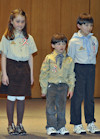
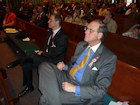  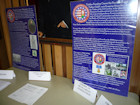 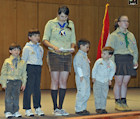
 
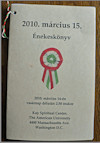 
Join online!

[back to all 1848 news] |
[ < back to AHF 1848 Commemorations ]
 In a related note, President Obama congratulated Hungary on its National Day and anniversary of its 1848 War of Liberation... "Today we honor the courageous Hungarians who set their country on the path to freedom.The legacy of the revolution continues to inspire as Hungarians advocate for freedom's cause," he said. [Download his letter]. In a related note, President Obama congratulated Hungary on its National Day and anniversary of its 1848 War of Liberation... "Today we honor the courageous Hungarians who set their country on the path to freedom.The legacy of the revolution continues to inspire as Hungarians advocate for freedom's cause," he said. [Download his letter].
Shortcuts:
Famous Quotes
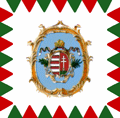 "the house of Habsburg-Lorraine, perjured in the sight of
God and man, had forfeited the Hungarian throne." "the house of Habsburg-Lorraine, perjured in the sight of
God and man, had forfeited the Hungarian throne."
Hungary, April 1849
"All for the people and all by the people. Nothing about
the people without the people. That is Democracy, and that is the ruling
tendency of the spirit of our age."
Spoken before the Ohio State Legislature,
February 16, 1852
About Louis
Kossuth
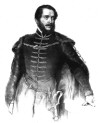 Kossuth
Lajos (b. 1802, d. 1894, pronounced co-shoot luh-yôsh)
was Governor of Hungary during fight for independence and democracy which
was eventually defeated by the union of the royalist Austrian Habsburg
and Russian Czarist Armies (1848 - 1849). Kossuth envisioned a federation
in the Kingdom of Hungary in which all nationalties participated in a
vibrant democratic system based on fundamental democratic principles such
as equality and parliamentary representation. The bloody conflict eventually
led to a great compromise known as the "Austro-Hungarian Empire,"
in which Hungary gained some autonomy. although Kossuth would have no
part in it and demanded full indepependence until his death. Kossuth
Lajos (b. 1802, d. 1894, pronounced co-shoot luh-yôsh)
was Governor of Hungary during fight for independence and democracy which
was eventually defeated by the union of the royalist Austrian Habsburg
and Russian Czarist Armies (1848 - 1849). Kossuth envisioned a federation
in the Kingdom of Hungary in which all nationalties participated in a
vibrant democratic system based on fundamental democratic principles such
as equality and parliamentary representation. The bloody conflict eventually
led to a great compromise known as the "Austro-Hungarian Empire,"
in which Hungary gained some autonomy. although Kossuth would have no
part in it and demanded full indepependence until his death.
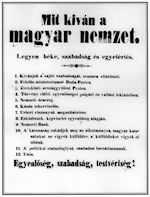 The speech from which the above excerpt is taken was given over a decade
before Lincoln's famed "for the people, by the people" speech
given at Gettysburg in 1863. Kossuth was the first foreign Statesman officially
invited to the US since the Marquis de Lafayette. His upcoming speech
in the Congress of the United States made the pre-civil war joint house
nervous due to his democratic views on equality of all men. Kossuth learned
English while in prison and exile and spoke to half the population of
the US who enthusiastically greeted and flocked to hear him. Despite Hungary's
epic struggle and Kossuth's brave and noble efforts, the US, the "Bastion
of Democracy" turned him away, empty handed. Hungary was alone again
in its fight for democracy in 1956, and didn't gain freedom until 1989. The speech from which the above excerpt is taken was given over a decade
before Lincoln's famed "for the people, by the people" speech
given at Gettysburg in 1863. Kossuth was the first foreign Statesman officially
invited to the US since the Marquis de Lafayette. His upcoming speech
in the Congress of the United States made the pre-civil war joint house
nervous due to his democratic views on equality of all men. Kossuth learned
English while in prison and exile and spoke to half the population of
the US who enthusiastically greeted and flocked to hear him. Despite Hungary's
epic struggle and Kossuth's brave and noble efforts, the US, the "Bastion
of Democracy" turned him away, empty handed. Hungary was alone again
in its fight for democracy in 1956, and didn't gain freedom until 1989.
Today, there are many reminders of Kossuth's impact on America and the
world. In North America, there is a Kossuth County in the state of Iowa,
a town with his name in Indiana, Ohio and Mississippi,
a settlement with a Kossuth Post Office is in Pennsylvania. In addition,
there are Kossuth statues and plaques in New York, Cleveland, Akron, New
Orleans, Washington, and Ontario, Canada. The Hungarian
Reformed Federation's building on Dupont Circle, in Washington, DC
is called Kossuth House with a memorial plaque commemorating his speech
on democracy. See the picture gallery and memorials on Louis
Kossuth in North America.
The renowned Ralph Waldo Emerson said in greeting Kossuth on his arrival
at Concord, MA, May 11, 1852:
"[we] have been hungry to see the man whose extraordinary eloquence
is seconded by the splendor and the solidity of his actions."
Kossuth was greeted with wild enthusiasm across the country. He was only
the second foreign leader (second to Lafayette) to address a joint session
of Congress. The American Hungarian Federation
dedicated a bust that now sits proudly in the US Capitol - it reads, "Louis
Kossuth, Father of Hungarian Democracy" [read more]
Audio
Resources
 Hear
Louis Kossuth Speak!
[Click Here] - This is the speech of Louis Kossuth which he gave for the dedication of the statue for the 13 Hungarian generals, who were executed at Arad, Hungary, on October 6, 1849 (Arad is in Rumania today after annexation due to the Treaty of Trianon in 1920 ).
Louis Kossuth was exiled after the fall of the Hungarian Liberation Fight of 1848 and made his permanent home in Torino (Turin), Italy. He could not attend the dedication of the monument at Arad, without risking arrest, so he recorded his speech inTurin, and sent it to Arad using the new technology of sound recording, called the phonograph. Hear
Louis Kossuth Speak!
[Click Here] - This is the speech of Louis Kossuth which he gave for the dedication of the statue for the 13 Hungarian generals, who were executed at Arad, Hungary, on October 6, 1849 (Arad is in Rumania today after annexation due to the Treaty of Trianon in 1920 ).
Louis Kossuth was exiled after the fall of the Hungarian Liberation Fight of 1848 and made his permanent home in Torino (Turin), Italy. He could not attend the dedication of the monument at Arad, without risking arrest, so he recorded his speech inTurin, and sent it to Arad using the new technology of sound recording, called the phonograph.
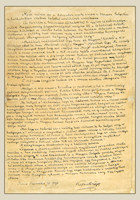 The recording was made on September 20, 1890, when Kossuth was 88 years old. It is a sad fact that the monument Kossuth sent his speech for was torn down by the Rumanian government when they annexed Transylvania, along with Arad, in 1920, after World War I. The recording was made on September 20, 1890, when Kossuth was 88 years old. It is a sad fact that the monument Kossuth sent his speech for was torn down by the Rumanian government when they annexed Transylvania, along with Arad, in 1920, after World War I.
The original
recording on two wax cylinders for the Edison phonograph survives to this
day, although barely audible due to excess playback and unsuccessful early
restoration attempts. Lajos Kossuth is the earliest born person
in the world who has his voice preserved. Since the audio
is of such poor quality, here is it is transcribed in Hungarian and translated
to English (special thanks to Louis
Kossuth in North America)
Hungarian |
English |
| "A világ bírája
a történelem fog e kérdésre felelni. Legyenek
a szentemlékû vértanúk megáldottak
poraikban, szellemeikben a hon szabadság Istenének
legjobb áldásaival az örökkévalóságon
keresztül; engem ki nem borulhatok le a Magyar Golgota porába,
engem október 6-a térdeimre borulva fog hontalanságom
remete lakában látni a mint az engem kitagadott Haza
felé nyújtva agg karjaimat a hála hû
érzelmeivel áldom a vértanúk szent emlékét
hûségükért a Haza iránt, 's a magasztos
példáért, melyet az utódoknak adtanak;
's buzgó imával kérem a magyarok Istenét,
hogy tegye diadalmassá a velõkig ható szózatot,
mely Hungária ajkairól a Magyar Nemzethez zeng. Úgy
legyen Ámen!
Turin
September 20 1890
Kossuth Lajos |
"The judge of the universe,
history, will decide over this question. Should the saintly remembered
martyrs be hallowed in their ashes, in their spirit with the highest
blessings of the Lord of Liberty and through eternity; I can not
pay my sympathies to the ashes of the Hungarian Golgotha, but October
6 will find me on my knees in this reclusive home of exile, as I
open my arms to my disowning homeland. With gratitude's faithful
sentiments, I bless the martyrs' sacred memory for their faith in
their homeland and for the sublime example they left to their heirs:
with ardent prayer I beg the God of Hungarians to make their appeal
which echoes from the lips of Hungaria to the Hungarian Nation.
So be it, Amen!
Turin
September 20 1890
Lajos Kossuth |
|
|
Click to hear the recording: |
"Kossuth Lajos azt üzente,
elfogyott a regimentje.
Ha még egyszer azt üzeni,
mindnyájunknak el kell menni,
Éljen a magyar szabadság,
Éljen a haza ! |
Esik esõ karikára,
Kossuth Lajos kalapjára.
Valahány csepp esik rája,
Annyi áldás szálljon rája,
Éljen a magyar szabadság,
Éljen a haza!" |
Links
- AHF and the Kossuth Bust in the US Capitol
- AHF commemorating 1848
- President Bush Honors 1848 and Hungary's Contributions to Democracy
- HRFA's excellent Kossuth in America [visit]
- Select Speeches of Kossuth, Condensed and Abridged, with Kossuth's
Express Sanction [visit]
- Louis Kossuth, Mason And Apostle Of World Democracy [visit]
- Count Apponyi's Oration on the Death of Louis Kossuth [visit]
- Wikipedia - [visit]
and add your thoughts!
- Louis Kossuth in North America [visit]
- Kossuth County, Iowa [visit]
- Kossuth County, Iowa statue dedication
[visit]
- Dedication of statue to replace one destroyed by Rumanian occupation
forces in 1921: Gyergyócsomafalva, Transylvania [visit]
 Sign
up for the AHF mailing list. Sign
up for the AHF mailing list.
Your information is not shared!
Join online!

|



